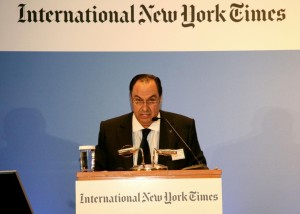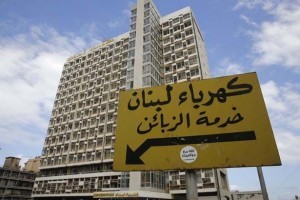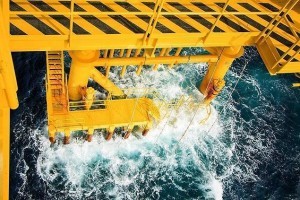Energy: Turkish Continuous Provocations in the East Mediterranean

By Roudi Baroudi
Cypriot President Nicos Anastasiades made full use of the high-profile stage created by the latest summit in Cairo with the leaders of Egypt and Greece, issuing a very public call for Turkey to adopt a “constructive stance” in addressing regional disputes.
Recent Turkish intrusions into the internationally recognized Republic of Cyprus’s Exclusive Economic Zone (EEZ) – at a time when Nicosia is working with private companies to determine the extent of the divided island’s offshore oil and gas reserves – have prompted the ROC to suspend peace talks with the self-styled “Turkish Republic of Northern Cyprus” (TRNC), which is recognized only by Ankara.
With both Egyptian President Fatah al-Sisi and Greek Prime Minister Antonis Samaras at his side following their talks, Anastasiades said the repercussions of Turkish actions could be far-reaching.
“Turkey’s provocative actions do not just compromise the peace talks, but also affect security in the Eastern Mediterranean region,” the Cypriot leader said. “For the negotiations to succeed, Turkey needs to show positive intentions and adopt a constructive stance through positive and effective steps in this direction.”
The summit appears to demonstrate that the ROC is making progress in its efforts to build multilateral support in the face of Turkish intimidation.
Indeed, Turkey’s latest gambit in the chess match over Cyprus’ oil and gas reserves is pure obstructionism because no one – including Turkey and its ally, the TRNC – will derive any benefit from the move.
Unless the right people decide otherwise, in which case the potential crisis touched off by the Turkish move could be transformed into an historic opportunity.
Notwithstanding political and diplomatic complications, the legal facts of the case are fairly straightforward. In 1974, Turkish troops invaded the northern third of Cyprus following a coup in Nicosia whose leaders sought an unlikely unification with Greece. Since that time, the Turkish military and more than 100,000 settlers have occupied just over 36% of the island, not only denying displaced Greek-Cypriots the right to return to their homes but also engaging in an illegal policy of systematically exploiting their properties. Successive governments in Ankara have steadily entrenched the occupation, even going so far as to establish the aforementioned TRNC in 1983.
Just as clearly, both the international community and all competent and independent legal authorities have conclusively rejected Turkey’s attempts to gain legitimacy for the TRNC. Resolutions by the United Nations Security Council have repeatedly declared the entity illegal and all of its actions null and void, and urged UN member-states to withhold both diplomatic recognition and all forms of assistance or facilitation. At the same time, a series of regional, national and international legal verdicts – including in the United States, the United Kingdom, several European countries, and the European Court of Human Rights – has comprehensively discredited 40 years of Turkish policy while unreservedly endorsing the right of the ROC to be regarded as the sole legitimate government of the island. In addition, Cyprus’ accession deal with the European Union specifies that although the ROC does not control the occupation zone, its residents are regarded as ROC citizens and therefore as EU ones.
This thorough refutation of Turkish claims enjoys virtually universal support, and until today, the TRNC is formally recognized by only one independent country: Turkey itself. The occupation zone uses the Turkish lira as its currency, direct air travel and many other forms of transport are allowed only from Turkey, and various embargos have resulted in badly stunted economic development.
Greek-Cypriots have yet to obtain redress for the depredations carried out against them, even the economy in the unoccupied two-thirds of the island has been prevented from realizing its potential, and the ROC’s sovereignty remains subject to gross violation. Despite all this, no one has suffered more hardship from Turkish policy and the resultant isolation of the TRNC than Turkish-Cypriots, almost half of whom are estimated to have emigrated since the original 1974 invasion.
An on-again, off-again peace process was rebooted in February of this year, but Turkey’s leaders demonstrated little enthusiasm, and now Ankara has erected yet another obstacle. At the beginning of October, Turkey issued a Navigational Telex (NAVTEX) declaring its intention to carry out offshore seismic surveys, between October 20 and December 20, in a huge area off the island’s southern and eastern coasts. This area lies well within the ROC’s internationally recognized EEZ and continental shelf, and overlaps substantially with undersea blocs already auctioned off for exploration by international energy companies, including Italian giant Eni and South Korea’s KOGAS. Nonetheless, when October 20 rolled around, the Turkish survey ship Barbaros was reported to have arrived on scene, accompanied by at least one warship and two support vessels.
Once again, the facts render Turkey’s actions null and void. Cyprus’ EEZ is recognized in bilateral delimitation agreements, concluded under the provisions of the UN Convention on the Law of the Sea (UNCLOS), between the ROC and each of the sovereign states with any possible counter-claims, including Egypt (2003), Israel (2010) and Lebanon (2007). Conversely, Turkey has yet to join UNCLOS, proclaim an EEZ, define the extent of its continental shelf, or conclude bilateral delimitation pacts with any of its neighbors in the Eastern Mediterranean. Turkey has, however, concluded delimitation deals with its neighbors in the Black Sea, lending its own weight to the very same international legal precedents that it refuses to abide by in the Eastern Med.
What all this – and so much more – means is that for all of Turkey’s bluster, any project to illegally exploit the ROC’s offshore resources is likely to be stillborn: few respectable countries (if any) will purchase this oil or gas, the isolation of the TRNC will continue, and Turkey could face both damaged trade relationships and even sanctions. In short, Turkey has little to gain, and probably much to lose, if it maintains its current course. Ankara is fully aware of this, so the threat implied by the NAVTEX and the Barbaros cannot be interpreted as anything but a spoiling tactic aimed at hampering the ROC’s own legitimate plans to develop an offshore energy sector by intimidating the government and its partners.
This is where the opportunity comes in. Previous attempts to settle the Cyprus conflict have failed, often reinforcing the kind of zero-sum-game approach that informs Turkey’s latest provocations. With the right handling, however, this time could be very different. The possibilities opened up by Cyprus’ own oil and gas reserves are highly lucrative, and now the EU has endorsed plans to make the island a major regional gas hub which would interconnect the output of several Eastern Mediterranean countries with markets in Europe via pipeline and/or LNG shipping. The incentive to get a reunification deal done has therefore been expanded geometrically, and extended to more third parties.
Apart from both Greek- and Turkish-Cypriots, the primary beneficiaries of such a settlement would be EU consumers, who would gain several advantages from easier and more reliable access to cheaper and greener energy supplies from within the European family. And since Eni is Italy’s largest industrial concern by market capitalization, that country in particular has a powerful motive to see the Cyprus mess cleaned up once and for all. Other major players like France’s Total and Schlumberger, as well as America’s Noble Energy and Halliburton, further widen the field of interested governments whose good offices could be put to good use. Above all else, the founding principles of both the EU and the UN demand that no effort be spared in ending this long and painful chapter of Cypriot history.
Conflicts over energy have fueled violence in many parts of the world, including nearby areas of the Middle East and North Africa. Now the international community has a chance to accomplish the opposite by leveraging energy wealth to end a decades-long dispute. That would serve the legitimate interests of all concerned, including Turkey, which could eventually gain the same access to attractive energy supplies as European countries. First, however, the warships have to return to port.
And stay there.
Roudi Baroudi is an Oil & Gas economist









